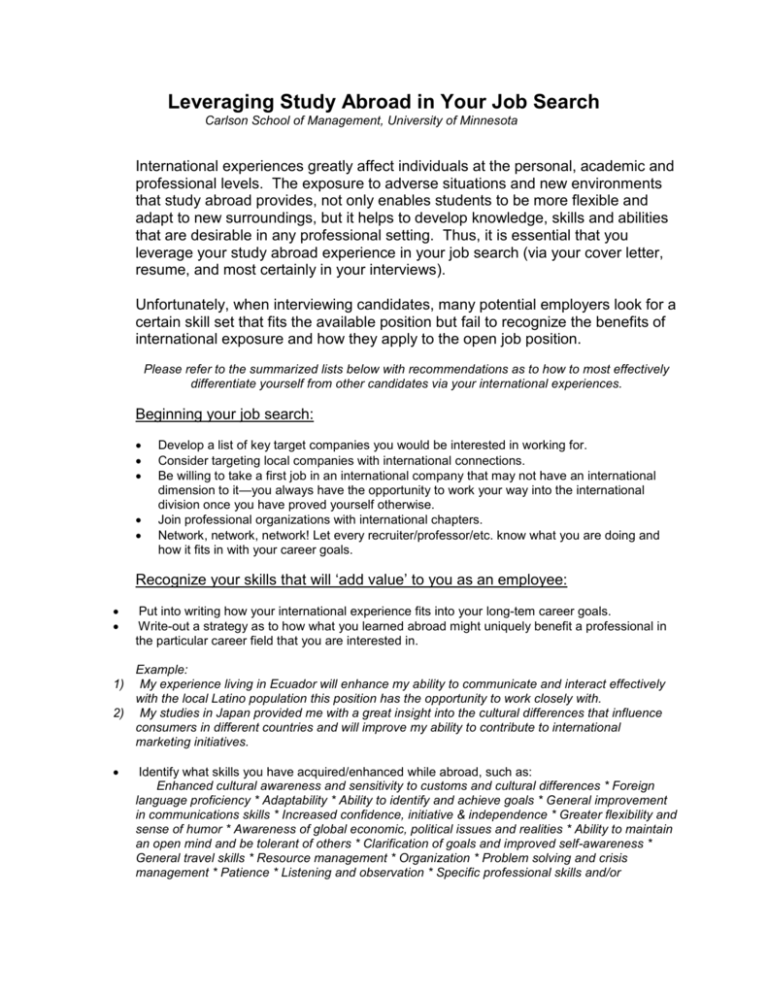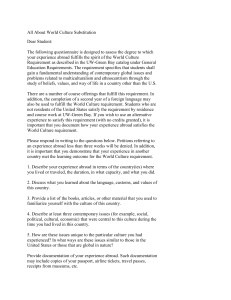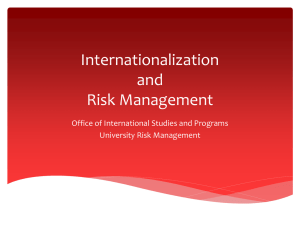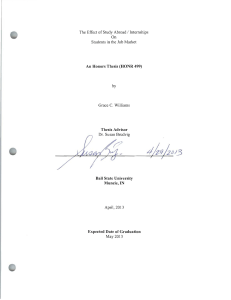Leveraging Study Abroad in Your Job Search Carlson School of
advertisement

Leveraging Study Abroad in Your Job Search Carlson School of Management, University of Minnesota International experiences greatly affect individuals at the personal, academic and professional levels. The exposure to adverse situations and new environments that study abroad provides, not only enables students to be more flexible and adapt to new surroundings, but it helps to develop knowledge, skills and abilities that are desirable in any professional setting. Thus, it is essential that you leverage your study abroad experience in your job search (via your cover letter, resume, and most certainly in your interviews). Unfortunately, when interviewing candidates, many potential employers look for a certain skill set that fits the available position but fail to recognize the benefits of international exposure and how they apply to the open job position. Please refer to the summarized lists below with recommendations as to how to most effectively differentiate yourself from other candidates via your international experiences. Beginning your job search: Develop a list of key target companies you would be interested in working for. Consider targeting local companies with international connections. Be willing to take a first job in an international company that may not have an international dimension to it—you always have the opportunity to work your way into the international division once you have proved yourself otherwise. Join professional organizations with international chapters. Network, network, network! Let every recruiter/professor/etc. know what you are doing and how it fits in with your career goals. Recognize your skills that will ‘add value’ to you as an employee: Put into writing how your international experience fits into your long-tem career goals. Write-out a strategy as to how what you learned abroad might uniquely benefit a professional in the particular career field that you are interested in. Example: My experience living in Ecuador will enhance my ability to communicate and interact effectively with the local Latino population this position has the opportunity to work closely with. 2) My studies in Japan provided me with a great insight into the cultural differences that influence consumers in different countries and will improve my ability to contribute to international marketing initiatives. 1) Identify what skills you have acquired/enhanced while abroad, such as: Enhanced cultural awareness and sensitivity to customs and cultural differences * Foreign language proficiency * Adaptability * Ability to identify and achieve goals * General improvement in communications skills * Increased confidence, initiative & independence * Greater flexibility and sense of humor * Awareness of global economic, political issues and realities * Ability to maintain an open mind and be tolerant of others * Clarification of goals and improved self-awareness * General travel skills * Resource management * Organization * Problem solving and crisis management * Patience * Listening and observation * Specific professional skills and/or knowledge base * Greater cultural understanding and sensitivity * Ability to work in cross-cultural team and function in ambiguous environments. How to incorporate study abroad in your resume, cover letter, & interview: Consider listing the program in your education section of your resume rather than under activities. Example: B.S. Indiana University---Kelley School of Business 2004 Universidad de Sevilla, Spain 2003 If you worked while abroad, list the experience and focus on the cross-cultural learning. Example: The Black Dog Pub, Cambridge, England Served patrons in a local restaurant, worked as the only American in a British business, trained co-workers in American style customer service. If the experience included an internship, list it as a professional experience rather than an activity. If your resume includes a section for skills or proficiencies, include specific skills acquired or improved while abroad. State that operating in a global arena and having international experience are key to being successful in today’s global market. Applicable Interview Questions: While abroad, did you: …Complete a specific project or research applicable to your field of interest? …Travel independently? …Learn to work with a more diverse group of people than you had previously been exposed to? …Resolve a conflict based on misunderstandings or cultural differences? Learn new activities, languages, hobbies or skills? Tell me about a time you: …Dealt with uncertainty or ambiguity. …Confronted a challenging situation. …Had to handle conflict. …Had to learn something new.








